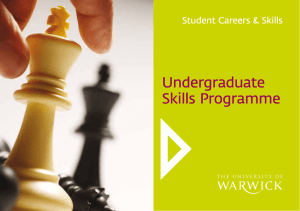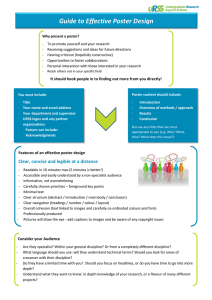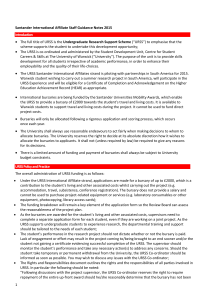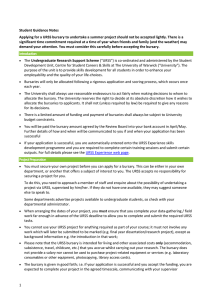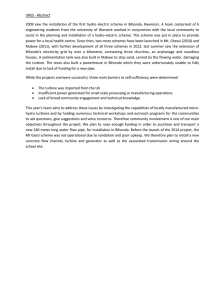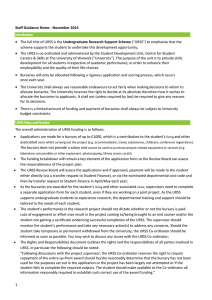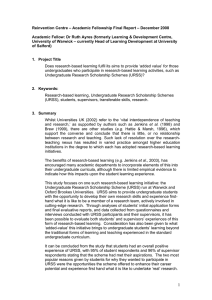Reinvention Centre - Interim Report – February 2008
advertisement
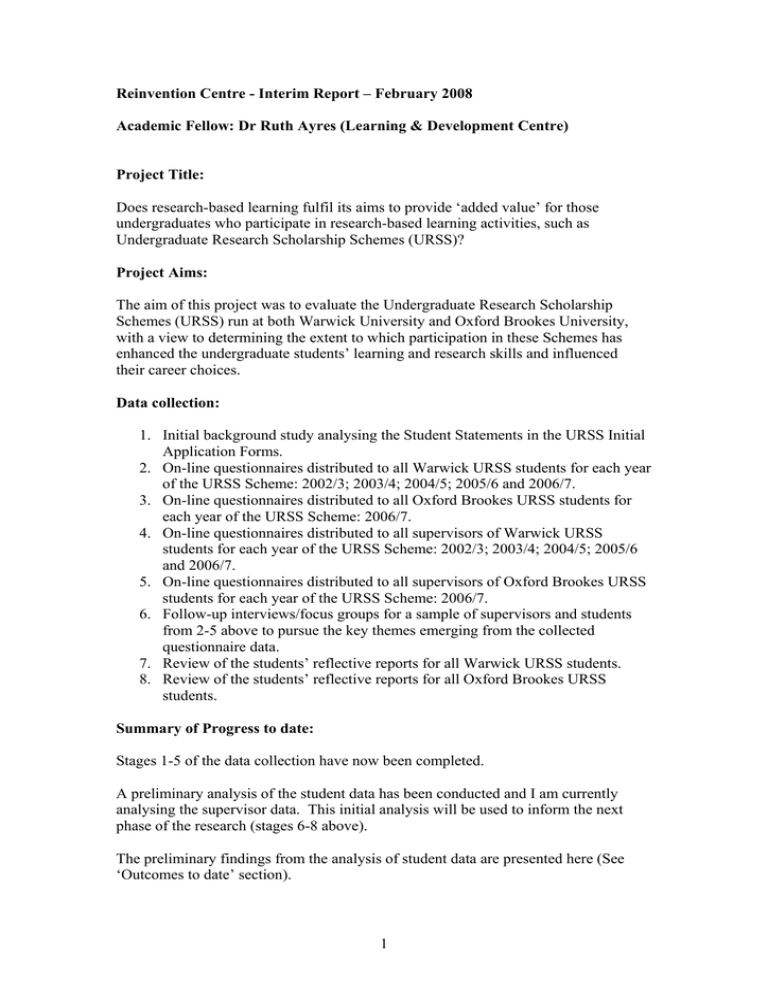
Reinvention Centre - Interim Report – February 2008 Academic Fellow: Dr Ruth Ayres (Learning & Development Centre) Project Title: Does research-based learning fulfil its aims to provide ‘added value’ for those undergraduates who participate in research-based learning activities, such as Undergraduate Research Scholarship Schemes (URSS)? Project Aims: The aim of this project was to evaluate the Undergraduate Research Scholarship Schemes (URSS) run at both Warwick University and Oxford Brookes University, with a view to determining the extent to which participation in these Schemes has enhanced the undergraduate students’ learning and research skills and influenced their career choices. Data collection: 1. Initial background study analysing the Student Statements in the URSS Initial Application Forms. 2. On-line questionnaires distributed to all Warwick URSS students for each year of the URSS Scheme: 2002/3; 2003/4; 2004/5; 2005/6 and 2006/7. 3. On-line questionnaires distributed to all Oxford Brookes URSS students for each year of the URSS Scheme: 2006/7. 4. On-line questionnaires distributed to all supervisors of Warwick URSS students for each year of the URSS Scheme: 2002/3; 2003/4; 2004/5; 2005/6 and 2006/7. 5. On-line questionnaires distributed to all supervisors of Oxford Brookes URSS students for each year of the URSS Scheme: 2006/7. 6. Follow-up interviews/focus groups for a sample of supervisors and students from 2-5 above to pursue the key themes emerging from the collected questionnaire data. 7. Review of the students’ reflective reports for all Warwick URSS students. 8. Review of the students’ reflective reports for all Oxford Brookes URSS students. Summary of Progress to date: Stages 1-5 of the data collection have now been completed. A preliminary analysis of the student data has been conducted and I am currently analysing the supervisor data. This initial analysis will be used to inform the next phase of the research (stages 6-8 above). The preliminary findings from the analysis of student data are presented here (See ‘Outcomes to date’ section). 1 Outcomes to date: 1. Initial Background Study In reviewing the Student Statements in the URSS Initial Application Forms, the students’ aspirations for the URSS were far-ranging and included categories such as the opportunity to follow an interest in the subject, the opportunity to gain subject-specific and transferable skills and the chance to experience research firsthand. By far the most popular reason cited for undertaking URSS was the opportunity the Scheme provided to aid career choices. There were two angles to this: Some students perceived that participation in URSS would help them to decide whether a career in research and/or future postgraduate study was really for them; whilst others perceived that participation in the URSS provided ‘added-value’ to their CVs, providing them with a better chance of gaining employment, or winning a place on a postgraduate programme of study. 2. Online survey of Warwick University URSS Students The response rate to the questionnaires was 24%, with almost equal numbers of male and female respondents (48% and 52% respectively) and a mix of nationalities. The majority of the sample comprised full-time students (90%), with the 18-25 grouping the most common age range in the sample (87%). Most respondents were from the Faculty of Science and Faculty of Social Studies, with representation from the Faculties of Arts and Medicine. As part of the online questionnaire, students were asked to identify the aspirations they had at the start of the URSS and these results are presented below in figure 1.0. Aid career choice Follow interest in subject Gain subjectspecific skills Experience research Enhance knowledge Gain transferable skills Work with experts 70 60 50 % 40 30 20 10 Work in new location/topic Develop self 0 Reason Figure 1.0 What were Warwick Undergraduate Students’ aspirations for URSS? (as expressed in the online questionnaire) 2 Students were then asked whether their aspirations had been met by the Scheme and what they felt they had gained from participating in URSS. 97% of respondents said yes, their aspirations had been met by the URSS, with the opportunity to experience research firsthand the highest cited benefit (53%) followed by the opportunity to develop oneself (43%) and then the opportunities to gain transferable skills (33%), aid career choice (27%) and work in a new location/subject area (27%) (See figure 2.0). 60 Aid career choice Follow interest in subject Gain subject-specific skills Experience research Enhance knowledge Gain transferable skills Make contribution to field Use to aid degree work Publication opps Work in new location/topic Develop self 50 40 % 30 20 10 0 Reason Figure 2.0 What did Warwick Undergraduate Students gain from participating in the URSS? (as expressed in the online questionnaire) It is interesting to note, that when applying for URSS, students identified the opportunity to aid their career choice/enhance their CVs as their main reason for undertaking URSS. This was perceived as less of a benefit on completion of the Scheme, however, with the opportunity to experience research firsthand identified as the greatest benefit, followed by self-development (which arose on only 5 % of Initial Application Forms). Similarly, promoting an interest in the subject and gaining subject specific skills did not rank as highly in the benefits listed by students in the post-URSS questionnaires, as they did in the Initial Application Forms. The gaining of transferable skills and the opportunity to work on a new topic, or in a new location, such as field work abroad, or archives not normally accessible to undergraduate students were both ranked more highly by students in terms of benefit in the post-URSS questionnaires than they had been in the Initial Application Forms. 3 3. Online survey of Oxford Brookes University URSS Students There was a response rate of 53% for the questionnaires, with the sample entirely made up of full-time students across the age range groupings. The majority of the sample was female (78%), from a range of nationalities. There was an even spread of respondents across three Schools: Arts & Humanities; Life Sciences and Social Sciences and Law. Like Warwick students, Oxford Brookes URSS students were asked to identify their aspirations for URSS before commencing the Scheme. Their responses are presented in figure 3.0 below. 70 Aid Career choice 60 Follow interest in subject Gain subject-specific skills Experience research 50 40 % Gain transferable skills 30 Apply degree work to project Use to aid degree work 20 10 Opportunity for 1:1 support Develop self 0 Reason Figure 3.0 What were Oxford Brookes Undergraduate Students’ aspirations for URSS? (as expressed in the online questionnaire) As with Warwick students, the most popular reason given for undertaking URSS was the opportunity to experience research firsthand (37%). This was followed by the opportunity to follow an interest in the subject (25%) and the opportunity to develop oneself (25%). (These latter two categories carry a similar weighting at both institutions). When asked whether their aspirations had been met by the Scheme, 87% of respondents confirmed that yes, their aspirations had been met by the Scheme. (This low percentage is a feature of the relatively small sample size (N=8) and equates to one student who cited the reason that ‘the research I took part in did not develop’). As figure 4.0 demonstrates, the opportunities to gain both subject-specific skills and transferable skills (both 50%) were the most commonly cited benefits of participating in the URSS Scheme. This was followed by the opportunities to experience research firsthand and develop oneself (both 37%). 4 60 Aid Career choice 50 Gain subject-specific skills Experience research 40 Enhance knowledge Gain transferable skills % 30 Make contribution to field Use to aid degree work 20 Work with experts Work in new location/topic 10 Develop self 0 Reason Figure 4.0 What did Oxford Brookes Undergraduate Students gain from participating in the URSS? (as expressed in the online questionnaire) 4. Similarities & Differences between Warwick URSS Students & Oxford Brookes URSS Students These initial findings clearly indicate some commonality between the two institutions with regard to the ways in which undergraduate students perceive they have benefited from undertaking the URSS. At both Oxford Brookes and Warwick, the three key benefits students felt that they had gained from undertaking URSS were: 1. The opportunity to experience research firsthand 2. The opportunity to gain transferable skills 3. The opportunity to develop oneself. At Oxford Brookes, this list was expanded to also include the opportunity to gain subject-specific skills, since students at this institution considered this benefit to be as important as the opportunity to gain transferable skills (see figure 4.0). There was some variation between institutions with regard to the exact value students attributed to each of the other benefits they identified (See figures 2.0 and 4.0). For example, no-one at Oxford Brookes identified publication opportunities or an interest in the subject as outcomes gained from working on their URSS projects, whereas these were seen as benefits obtained from participating in the Scheme by some Warwick students. The data clearly indicate that there were differences between what students were hoping to gain from URSS and what they felt they had actually gained from participating in the Scheme. This area will be explored further in the interview phase. Interestingly, one-to-one support/mentoring and the application of degree work to URSS research work were not identified as benefits of the Scheme by any of the students at either institution. 5 The vast majority of respondents reported that participation in the URSS encouraged them to consider pursuing further research (60% at Warwick and 74% at Oxford Brookes), with 17% put off pursuing further research at Warwick and 13% put off pursuing further research at Oxford Brookes. The qualitative data providing explanations for these answers are still to be explored. 5. Online Surveys of URSS Supervisors The supervisor data is currently being analysed and will be reported in full in the final report. 6. Future Research The intention is to conclude the analysis of the collected questionnaire data (including a full analysis of the qualitative data) and then review the students’ reflective reports in March – April 2008. The follow-up interviews/focus groups with URSS students and supervisors are planned to take place in May - August 2008, with a view to conducting the final analysis and report-writing in September – December 2008. The aim of the follow-up interviews/focus groups is to build upon the current findings and further investigate some of the emerging themes, exploring the background and reasons for the responses given in the questionnaires. (1552 words) 6
